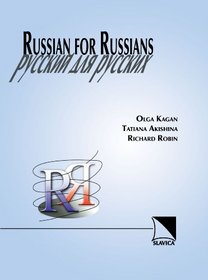Search -
Russian for Russians
Russian for Russians
Author:
The rapid growth in the number of Russian heritage students in our high schools and colleges represents an underserved and underutilized national language resource. By "heritage speaker" we mean those who grew up with Russian in North America without a native Russian's full educational or cultural background. Because of their diffe... more »
Author:
The rapid growth in the number of Russian heritage students in our high schools and colleges represents an underserved and underutilized national language resource. By "heritage speaker" we mean those who grew up with Russian in North America without a native Russian's full educational or cultural background. Because of their diffe... more »
ISBN-13: 9780893573010
ISBN-10: 0893573019
Publication Date: 12/1/2002
Rating: ?
ISBN-10: 0893573019
Publication Date: 12/1/2002
Rating: ?
0 stars, based on 0 rating
Genres:
- Reference >> Foreign Language Study & Reference >> Instruction >> Russian
- Reference >> Foreign Language Study & Reference >> Russian
- Reference >> Words, Language & Grammar >> Study & Teaching
- Nonfiction >> Foreign Language Nonfiction >> Russian




